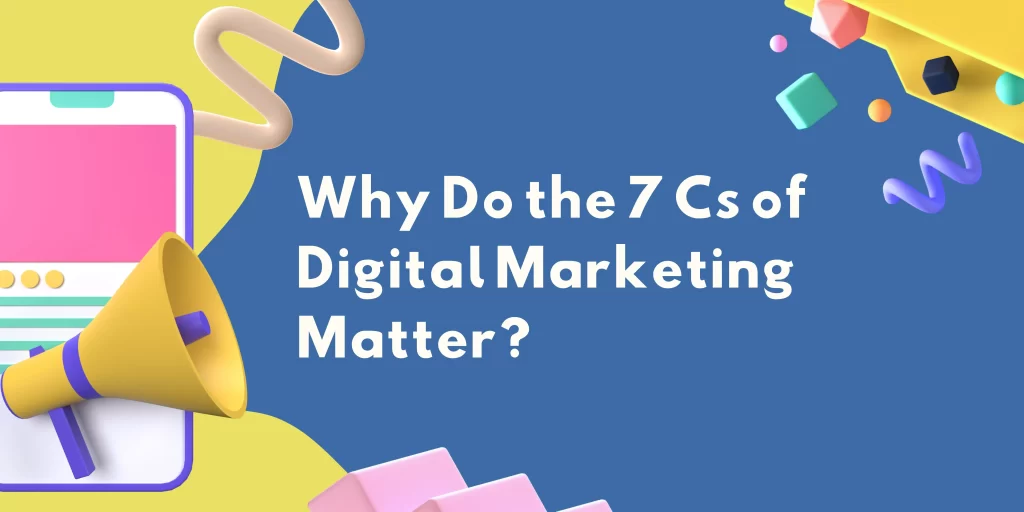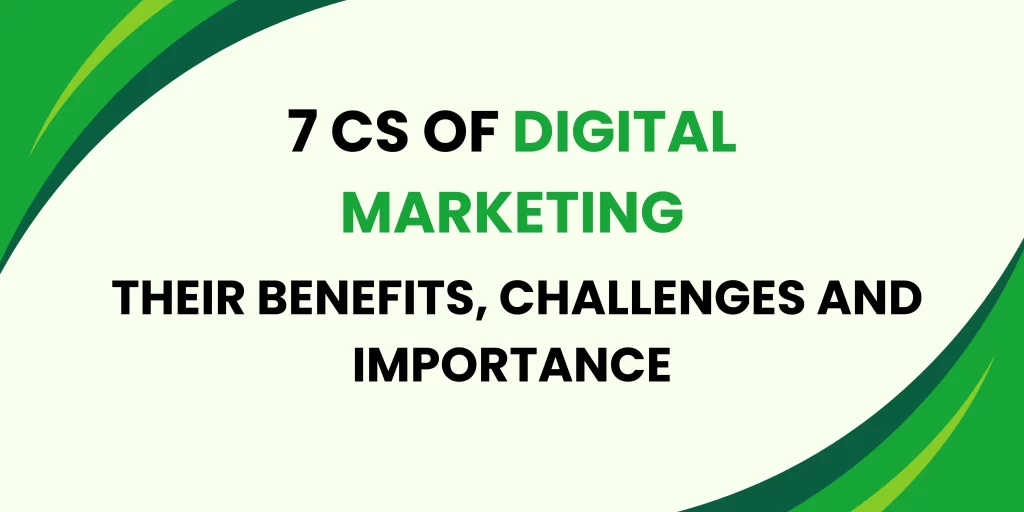The 7 C’s of Digital Marketing are content, context, connection, community, customization, communication, and conversion. They construct narratives, foster relationships, and drive progress in an ever-changing landscape. And these ideas are at the heart of efficient digital marketing, propelling firms to relevance and success in the ever-changing online environment. As we explore why the 7 Cs matter for businesses navigating the complexity of digital marketing, we will examine the significance of each C with Mohit’s SEO Training, which offers Training on Marketing strategies like SEO and performance marketing. Now, let’s go further!
Why Do the 7 C’s of Digital Marketing Matter?
Let’s know each one of the 7c of digital marketing importance in digital marketing:
1 Content
Engaging audiences, building authority, and increasing organic traffic requires high-quality content. Likewise, successful Indian companies use content marketing to tell intriguing stories. For example, Amul’s imaginative and relevant topical advertisements have become part of Indian pop culture.
2 Context
Understanding the environment in which people interact with content allows marketers to customize their efforts for optimal impact. Likewise, during festivals like Diwali, Indian e-commerce giants such as Flipkart and Amazon tailor their marketing tactics to include festive-themed advertising, exclusive deals, and targeted promotions.
3 Connection
Getting connected with your audience via social media and other platforms develops brand loyalty and trust. Additionally, through funny and relatable social media participation, Indian company Zomato has developed a strong relationship with users, building a feeling of community around food enthusiasts.
4 Community
A healthy community can lead to word-of-mouth marketing and user-generated content, driving organic growth. In India, online communities such as “Redditors” regularly participate in conversations, and brands such as OnePlus have effectively interacted with this community for product introductions and marketing.
5 Customization
They improve engagement and conversion rates by personalizing the user experience depending on preferences. Likewise, e-commerce platforms such as Myntra and Flipkart make personalized suggestions based on customer browsing and purchase history. Thus, resulting in a more personalized purchasing experience.
6 Communication
Consistent and clear communication increases brand awareness, trust, and loyalty. For example, Tata Group expresses its commitment to social responsibility and sustainability, which resonates with Indian consumers who respect ethical corporate practices.
7 Conversion
The ultimate digital marketing goal is to promote conversions frequently, whether sales, sign-ups, or other desired actions. Moreover, online travel providers such as MakeMyTrip use targeted marketing efforts to convert website visitors into booking customers, incentivizing conversions with discounts and promotions.
These digital marketing ideas may be found in various industries in India, ranging from e-commerce to food delivery and social networking to online travel services. In addition, successful companies understand the intricacies of the Indian consumer ecosystem. Likewise, using these concepts to establish growth and long-term relationships with their audiences.
7c of Digital Marketing: Benefits and Challenges
Let’s discuss all 7c of digital marketing benefits and challenges right here:
The Benefits:
- Audience Reach: Digital marketing enables businesses to find a worldwide audience, transcending geographical boundaries. Similarly, targeting specific demographics means that marketing resources are in efficient usage.
- Measurable Results: Digital marketing offers precise analytics, allowing organizations to track campaign success. Moreover, marketers can track the return on investment (ROI) more precisely than traditional approaches.
- Cost-Effectiveness: Unlike traditional marketing methods, digital marketing frequently involves less expenditure. Likewise, budgets for digital marketing can be adjusted based on performance and goals.
- Engagement: Social media and other digital platforms allow real-time audience engagement. In addition, various digital mediums offer options for interactive content and engagement.
- Flexibility and Adaptability: Digital marketing adjusts campaigns quickly based on real-time input. In addition, businesses may keep up with changing digital trends by modifying their tactics.
The Challenges:
- Market Saturation and Competition: The digital world is increasingly saturated. And it makes it difficult to stand out. In crowded internet environments, many businesses compete for attention.
- Data Privacy Concerns: Companies must manage shifting data privacy requirements to comply. Likewise, this is a sensitive task balancing personalized marketing with user privacy concerns.
- Content Overload: Every day, audiences are exposed to such content, resulting in weariness. Likewise, it might be challenging to balance providing quality material and the amount required.
- Technological Complexity: Due to the rapid evolution of digital technologies, ongoing learning and adaptability are required. So, integrating many digital tools and platforms might take a lot of work.
- Cybersecurity concerns: Data gathering and handling in digital marketing pose cybersecurity concerns. Moreover, businesses must protect themselves against cyber dangers like phishing and online fraud.
Also Read: Customer Behaviour in Digital Marketing and Factors That Affect It
How To Tackle The Challenges of 7c of Digital Marketing?
A deliberate and flexible approach is required to address the issues associated with the 7 C’s of digital marketing. So, here are some guidelines for each challenge:
Competition and Saturation:
- Firstly, create a distinct value proposition and brand identity.
- Pay extra attention to niche markets or specialized services.
- Identify and appeal to specific audience segments.
- Create memorable communications that stand out in the marketplace.
Data Privacy Issues:
- Stay up to date on data privacy regulations.
- Seek legal advice to ensure compliance.
- Make data usage restrictions clear to consumers.
- Make apparent opt-in alternatives available for data collection.
Information Overload:
- In content production, prioritize quality above quantity.
- Ensure that the content is relevant to the audience’s interests and needs.
- Create a recurring and reasonable content timetable.
- Mix up your content genres to keep your audience interested.
Technological Difficulty:
- Invest in ongoing training for digital marketing staff.
- Stay current on technical breakthroughs and industry trends.
- Implement systems that effortlessly integrate.
- Encourage IT and marketing departments to collaborate.
Cybersecurity Threats:
- Set aside funds for solid cybersecurity measures.
- Conduct regular audits to discover and fix vulnerabilities.
- Conduct employee cybersecurity awareness programmes.
- Lastly, create defined protocols for dealing with sensitive data.
In conclusion, while the seven c’s of digital marketing provide various benefits, organizations must overcome hurdles. And a well-informed and deliberate strategy is required for success in today’s volatile digital economy.
The 7 C’s of Digital Marketing are content, context, connection, community, customization, communication, and conversion. They construct narratives, foster relationships, and drive progress in an ever-changing landscape. And these ideas are at the heart of efficient digital marketing, propelling firms to relevance and success in the ever-changing online environment. As we explore why the 7 Cs matter for businesses navigating the complexity of digital marketing, we will examine the significance of each C with Mohit’s SEO Training, which offers Training on Marketing strategies like SEO and performance marketing. Now, let’s go further!

Why Do the 7 C’s of Digital Marketing Matter?
Let’s know each one of the 7c of digital marketing importance in digital marketing:
1 Content
Engaging audiences, building authority, and increasing organic traffic requires high-quality content. Likewise, successful Indian companies use content marketing to tell intriguing stories. For example, Amul’s imaginative and relevant topical advertisements have become part of Indian pop culture.
2 Context
Understanding the environment in which people interact with content allows marketers to customize their efforts for optimal impact. Likewise, during festivals like Diwali, Indian e-commerce giants such as Flipkart and Amazon tailor their marketing tactics to include festive-themed advertising, exclusive deals, and targeted promotions.
3 Connection
Getting connected with your audience via social media and other platforms develops brand loyalty and trust. Additionally, through funny and relatable social media participation, Indian company Zomato has developed a strong relationship with users, building a feeling of community around food enthusiasts.
4 Community
A healthy community can lead to word-of-mouth marketing and user-generated content, driving organic growth. In India, online communities such as “Redditors” regularly participate in conversations, and brands such as OnePlus have effectively interacted with this community for product introductions and marketing.
5 Customization
They improve engagement and conversion rates by personalizing the user experience depending on preferences. Likewise, e-commerce platforms such as Myntra and Flipkart make personalized suggestions based on customer browsing and purchase history. Thus, resulting in a more personalized purchasing experience.
6 Communication
Consistent and clear communication increases brand awareness, trust, and loyalty. For example, Tata Group expresses its commitment to social responsibility and sustainability, which resonates with Indian consumers who respect ethical corporate practices.
7 Conversion
The ultimate digital marketing goal is to promote conversions frequently, whether sales, sign-ups, or other desired actions. Moreover, online travel providers such as MakeMyTrip use targeted marketing efforts to convert website visitors into booking customers, incentivizing conversions with discounts and promotions.
These digital marketing ideas may be found in various industries in India, ranging from e-commerce to food delivery and social networking to online travel services. In addition, successful companies understand the intricacies of the Indian consumer ecosystem. Likewise, using these concepts to establish growth and long-term relationships with their audiences.

7c of Digital Marketing: Benefits and Challenges
Let’s discuss all 7c of digital marketing benefits and challenges right here:
The Benefits:
- Audience Reach: Digital marketing enables businesses to find a worldwide audience, transcending geographical boundaries. Similarly, targeting specific demographics means that marketing resources are in efficient usage.
- Measurable Results: Digital marketing offers precise analytics, allowing organizations to track campaign success. Moreover, marketers can track the return on investment (ROI) more precisely than traditional approaches.
- Cost-Effectiveness: Unlike traditional marketing methods, digital marketing frequently involves less expenditure. Likewise, budgets for digital marketing can be adjusted based on performance and goals.
- Engagement: Social media and other digital platforms allow real-time audience engagement. In addition, various digital mediums offer options for interactive content and engagement.
- Flexibility and Adaptability: Digital marketing adjusts campaigns quickly based on real-time input. In addition, businesses may keep up with changing digital trends by modifying their tactics.
The Challenges:
- Market Saturation and Competition: The digital world is increasingly saturated. And it makes it difficult to stand out. In crowded internet environments, many businesses compete for attention.
- Data Privacy Concerns: Companies must manage shifting data privacy requirements to comply. Likewise, this is a sensitive task balancing personalized marketing with user privacy concerns.
- Content Overload: Every day, audiences are exposed to such content, resulting in weariness. Likewise, it might be challenging to balance providing quality material and the amount required.
- Technological Complexity: Due to the rapid evolution of digital technologies, ongoing learning and adaptability are required. So, integrating many digital tools and platforms might take a lot of work.
- Cybersecurity concerns: Data gathering and handling in digital marketing pose cybersecurity concerns. Moreover, businesses must protect themselves against cyber dangers like phishing and online fraud.
How To Tackle The Challenges of 7c of Digital Marketing?
A deliberate and flexible approach is required to address the issues associated with the 7 C’s of digital marketing. So, here are some guidelines for each challenge:
Competition and Saturation:
- Firstly, create a distinct value proposition and brand identity.
- Pay extra attention to niche markets or specialized services.
- Identify and appeal to specific audience segments.
- Create memorable communications that stand out in the marketplace.
Data Privacy Issues:
- Stay up to date on data privacy regulations.
- Seek legal advice to ensure compliance.
- Make data usage restrictions clear to consumers.
- Make apparent opt-in alternatives available for data collection.
Information Overload:
- In content production, prioritize quality above quantity.
- Ensure that the content is relevant to the audience’s interests and needs.
- Create a recurring and reasonable content timetable.
- Mix up your content genres to keep your audience interested.
Technological Difficulty:
- Invest in ongoing training for digital marketing staff.
- Stay current on technical breakthroughs and industry trends.
- Implement systems that effortlessly integrate.
- Encourage IT and marketing departments to collaborate.
Cybersecurity Threats:
- Set aside funds for solid cybersecurity measures.
- Conduct regular audits to discover and fix vulnerabilities.
- Conduct employee cybersecurity awareness programmes.
- Lastly, create defined protocols for dealing with sensitive data.
In conclusion, while the seven c’s of digital marketing provide various benefits, organizations must overcome hurdles. And a well-informed and deliberate strategy is required for success in today’s volatile digital economy.

Mohit Verma is an experienced professional with 9 years of experience in Search Engine Optimization. He has worked with many brands such as Bank of Baroda, 1boxoffice, and Ozonetel. He is on a mission to provide industry focused job oriented SEO and Google Ads Training, so the students/mentees can go and start working from day 1.
